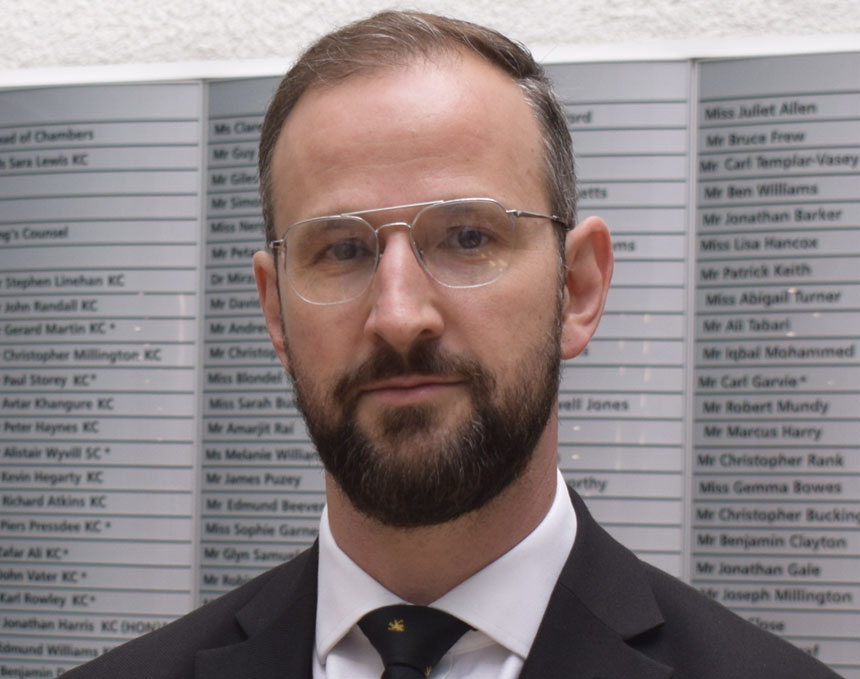Introduction
Will Smout is a tenacious and technically skilled criminal law barrister. He relishes working within the criminal law arena and possesses a real flair for advocacy. Will has a wealth of experience representing clients across the spectrum of criminal offences in the Crown Court including:
- Homicide (including assisting offenders)
- Serious violence
- Sexual offences including Rape, sexual offences against children and historic offences
- Drug offences
- Organised crime and conspiracies
- Fraud
Will brings confidence and reassurance to his clients in every case; he is personable and intuitive to their needs before and during the trial process.
Having worked as a senior lecturer teaching criminal litigation at BPP University and University of the West of England on the barrister training course, Will is quick to appreciate legal issues and commands an audience with his grip of the criminal law.
Organised Crime
R v K & others
Junior defence counsel in a multi-handed conspiracy to supply over £3million worth of cocaine. This case involved 10,000 pages of evidence.
R v W
Defence counsel in a conspiracy to steal over £1million agricultural equipment.
Serious sexual offences
R v G
Defence counsel for an indictment with four counts of historic rape. Careful cross-examination exposed that it was highly likely there was a relationship between the parties which affected the complainant’s credibility and in turn resulted in a hung jury.
R v M
Rape of a child under 16. This case involved sensitive cross-examination of a vulnerable child over live-link following the advocate’s toolkit principles.
R v D
Historic rape of a child whereby the complainant was asserting she was a lesbian and had never had any interest in males; Will acted for the defence. Within the unused material, he identified a caution for indecent assault of a male that the complainant accepted just prior to the dates of the indictment. Therefore, he lodged a skeleton argument to introduce this caution and for leave to cross-examine the complainant upon it by virtue of s.100 CJA 2003, non-defendant bad character and s.41 YJCEA 1999, restrictions on cross-examination of complainant’s sexual history. Following reference to the leading case of R v Hamadi [2007] and rule 22 CrPR, the application was successful. This evidence was key in undermining the complainant’s credibility and led to a hung jury.
Violence
R v M
Conspiracy to blackmail and cause GBH in a prison. The complainant was serving 20 years for firearms offences, however the judge ruled this would not be disclosed to the jury. This became a cut-throat case resulting in all the other defendants having successful bad character applications made against them for attacking the character of other witnesses (s.101 (1) (g) CJA 2003) or creating false impressions (gateway f). Even though Will’s client wanted to attack the complainant’s credibility, he was able to advise him to remain calm, tell his story and retain his shield. This was key in securing a hung jury and subsequent offer of no evidence by the crown prior to the retrial.
R v W
W, a young man on a night out was charged with causing GBH, namely a fractured and displaced skull. The complainant was struck from behind, so the evidence came from largely circumstantial evidence and direct evidence before and after the punch. One of the key pieces of evidence was that the complainant heard another witness say to the defendant ‘you just whacked my boy.’ Will lodged a skeleton argument that this statement was hearsay (s.114 and s.115 CJA 2003) and therefore inadmissible following the guidance in the leading case of Twist [2011]. This was opposed by the crown raising arguments of original evidence and the purported purpose of the statement. The judge ruled the statement inadmissible. Will’s strong case management strategies and ability to identify, raise and tackle legal argument resulted in the defendant being acquitted unanimously.
Motoring offences
Will operated a defence practice for many years representing clients via the public access to counsel rules. Offences ranged from drink driving to more serious offences of causing serious injury by dangerous driving.
Notable cases:
R v F
Young client was charged with causing serious injury by dangerous driving resulting in numerous casualties. Multiple witnesses indicated he had been racing and showing off before the accident. Despite the guidelines, immediate custody was avoided.
R v H
Special reasons found for not disqualifying a motorist despite a total of 28 points amassed due to confusing speed signage on a motorway.
R v T
Exceptional hardship found by the bench based on familial hardship to a businessman’s wife if he were to lose his driving licence. Disqualification avoided.
R v C
Use of expert evidence to show the drink drive reading was inaccurate due to gastrointestinal reflux. Disqualification avoided.
R v T
Charged with no insurance of an off-road motorcycle and riding it on the road. Police crushed the defendant’s motorcycle and therefore destroyed the evidence he required to prove his bike was not operational. Defendant was acquitted.
Academic and Other
Family law
Will has experience as a divorce and matrimonial barrister. This has resulted in robust negotiation skills and a sensitive approach to certain clients and witnesses when the need arises. Understanding and litigating family matters such as non-molestation and occupation orders is relevant to many domestic cases within the criminal courts.
Inns of court tutor training / Lecturing
As a lecturer at BPP University on the barrister training course, Will received coaching from King’s Counsel at the Inns of Court in relation to the suggested approach students are taught advocacy. He worked closely with barristers and colleagues in assessing the student’s oral skills, giving feedback, developing exemplar videos and material. This gave Will the opportunity to really understand and analyse what make a persuasive advocate and adopt the best approach to his own practice. He also became exceptionally familiar with evidential principles of criminal litigation such as hearsay and bad character having taught three successive cohorts these modules.
Ethics
Will comes from a particularly strong ethical background as not only is he an established practitioner, having completed all requirements by the BSB in relation to ethics, he has also taught three cohorts of bar students (2019-2022) on the barrister training course the principles of professional ethics, the code of conduct, the Farquharson guidelines, social media guidance and developed manuals, learning material and exam questions in relation to ethical duties as a barrister.
Digital proficiency
Further to the information in the above section, Will is proficient with the technology in the Crown Court, playing digital media and accessing court files.
Mooting and assessing barrister skills
Will has drafted and delivered lectures in ethics, criminal litigation, conference skills, witness handling and submission advocacy at BPP and UWE Universities on the barrister training course. He also sits as a mooting judge. Therefore, he has spent a period of his career digesting the core values, law, and skills of the profession.














